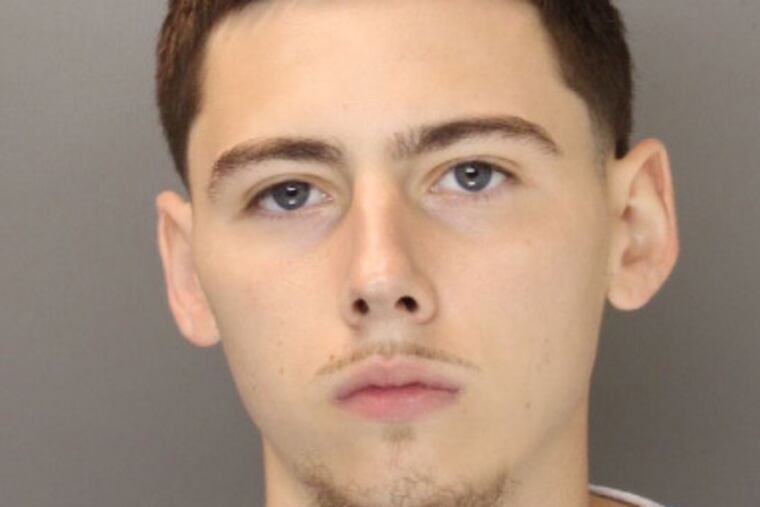Sean Kratz’s murder trial ends with jurors asked to deliver justice for victims in Bucks slayings
Kratz, 22, is accused of shooting one teen and helping his cousin, Cosmo DiNardo, rob and kill two others.

More than two years after the violent killings of three young men on a secluded Bucks County farm, prosecutors on Tuesday asked a jury to deliver justice for the victims and convict Sean Kratz of murder.
Kratz, 22, is accused of shooting Dean Finocchiaro, 22, in the head and acting as a lookout as his cousin Cosmo DiNardo killed Thomas Meo, 21, and Mark Sturgis, 19. In a recorded statement to investigators, Kratz confessed to his participation in the violence masterminded by DiNardo under the guise of a drug transaction.
“Let’s be clear,” First Assistant District Attorney Gregg Shore said during his closing arguments in a Doylestown courtroom. “Dean, Tom, and Mark would be alive if not for the actions of this defendant.”
Shore told the jury Kratz has been a manipulator since the very beginning of the case: He lied to investigators in conflicting statements about the deaths of the three victims, shot and buried in a makeshift grave on the DiNardo family farm in Solebury Township. He lied to prosecutors earlier this year, unexpectedly backing out of a plea deal for third-degree murder.
And he has lied to jurors, Shore said, saying he shot Finocchiaro out of fear, threatened by his cousin and co-conspirator.
Shore asked the jurors to convict Kratz of first- and second-degree murder, conspiracy, and abuse of corpse in the three deaths.
“The actions, admitted by this defendant and corroborated by a mountain of evidence, demand that verdict,” the prosecutor said.
Kratz’s attorney, A. Charles Peruto Jr., presented a different view. In Peruto’s words, Kratz was “slow” — with an IQ of 79 — and afraid of his “lunatic” cousin, who had earlier killed a fourth man, 19-year-old Jimi Patrick.
Because of that “duress,” Peruto said, Kratz should be acquitted or, at the worst, found guilty of manslaughter.
“Where is the malice on part of Sean Kratz?” Peruto asked. “Why would he want any of these kids dead? What would he get out of it?”
Peruto railed against prosecutors, who earlier Tuesday revealed that they were unable to get DiNardo to comply with a subpoena to testify.
The veteran defense attorney said DiNardo “double-crossed” the District Attorney’s Office. He insinuated that prosecutors were hesitant to call DiNardo because he would “scare to death” the jurors and cause them to view Kratz more sympathetically.
In a surprise move, Kratz declined to testify, despite earlier assurances from Peruto that he would.
Instead, Peruto rested his defense after calling just three witnesses: DiNardo’s parents, Antonio DiNardo and Sandra Affatato-DiNardo, and Kratz’s younger sister, Marissa.
DiNardo, 22, is serving life in prison after pleading guilty to the four killings this year in a deal in which he was spared the death penalty and agreed to testify against Kratz. But when it came time for him to appear in court, he refused. Bucks County Chief Detective Martin McDonough, a lead investigator on the case, testified late Friday that DiNardo refused to leave his cell when called to testify.
On Tuesday, McDonough said Judge Jeffrey L. Finley had not submitted any new subpoenas for DiNardo to appear. (In Pennsylvania, only a judge can order corrections officials to bring an inmate to court, according to Susan McNaughton, a spokesperson for the state Department of Corrections.)
Earlier in the day, jurors heard from relatives of the victims.
Sturgis’ mother, Aimee King, testified that the days after her son’s disappearance were agonizing, spent waiting for answers on the DiNardo family farm.
“I was in shock; that shock lasted a while,” King said through tears. “But even being in shock, it’s unbearable. It’s not even a matter of getting through the day — it’s like, how do I get through one minute, one hour?”
Detectives testified that in the days after the killings, Kratz casually texted his girlfriend, arranging a date. He also exchanged messages with his mother, asking her to buy him a new pair of sneakers.
There was no indication, as the defense had previously indicated, that he was shaken by the violence and sought help from his family.